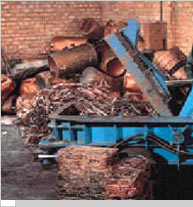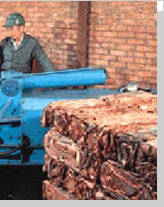The economy of the copper and copper alloy industry depends on the economic recycling of any surplus products. Process scrap, which arises from manufacturing processes is saved and traded for recycling to keep down the cost of the final product. On an average, about 40% of all production is obtained from recycled metal. For few products the proportion is more than 90%.


Recycling of copper and copper alloys is relatively cheap, with small power consumption, and with minimal losses. The recycling of copper and its alloys play a significant role in the economics of production, which has been undertaken since the beginning of copper industry. The cost of the raw material can be considerably reduced if an alloy can be made using recycled material. If the scrap is high purity copper and has not been contaminated by other metals, it can be used to make a high quality product. Likewise, if the scrap is kept segregated and comprises only of one alloy composition it is easier to remelt to a superior quality product conforming to industry standards.
Types / Grades of Copper ScrapDifferent grades and varieties of copper scrap are used for recycling purposes and to recover pure copper from the scrap. Given in the table below are some of the important grades / types of copper used in recycling.Click for the table
ApplicationsCopper has a variety of attributes that make it useful in so many applications today. The metal has found to be a highly efficient conductor of heat and electricity, in addition to it being flexible, durable, strong and resistant to corrosion. The metal has been a key to many of technological advancements of man, the most important being electricity and telegraphic communications. The other important applications of copper metal include its uses in heating, plumbing, air conditioning, brass fittings, roofing, and in the production of various products, which now we take for granted - Radio, television, lighting, computers, mobile phones etc. All these products require copper wiring, adapters, electrical leads, transformers and motors. Several copper compounds and chemicals are also used to protect crops and plants to preserve wood.
Copper ProductionIn particular, copper is not a rare metal and is produced in several countries across the world. The graphical representation shows the geographical distribution of primary supply of copper metal. At present, the total supply of copper is made up from two sources, the bulk, 88%, comes from the primary production, which is new copper mined from the ground, however growing importance is of secondary supply that accounts for 12% of total refined supply of copper. Secondary supply comes from recycling of copper scrap.
Primary supply comprises mining copper ores that typically comes in two forms, copper sulfides or copper oxides. The ore can be processed by one of two methods, which depends on the type of ore mined. Copper sulphide ore is first concentrated, then smelted and then refined, each of these stages is a distinct process and can be undertaken at a different location.
Future OutlookThe recycling of copper is primarily market driven across the world and this will continue to be the case for the foreseeable future, with the recycling sector consistently gaining strength. This strength, however, is typically a reflection of consistently increasing consumption of metals and production of waste. As long as this is the case, the prices of scrap will remain high and the recycling rates should see at least a marginal improvement every year.
The governments in several countries have played an important role in the past where there is excessive production of waste in a sector or region, where a human health risk is contemplated, or where international obligations necessitate action.
Copper Scrap Recycling - Associations- Canadian Copper & Brass Development Association
- Institute of Scrap Recycling Industries
- Australian Metal Recycling Industry Association
- Copper Development Association
